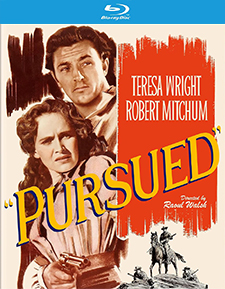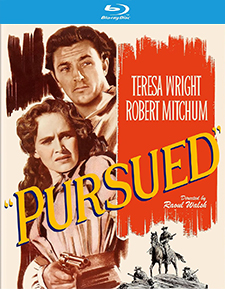Pursued (1947) (Blu-ray Review)

Director
Raoul WalshRelease Date(s)
1947 (June 4, 2024)Studio(s)
United States Pictures/Warner Bros. (Kino Lorber Studio Classics)- Film/Program Grade: B+
- Video Grade: A
- Audio Grade: A
- Extras Grade: B
Review
Pursued is a Western that draws on elements of film noir—a mysterious protagonist, copious use of flashbacks, and key sequences shot at night. The central character is a good man drawn into intrigue because of dark events that occurred when he was a child.
At the turn of the twentieth century, Thorley Callum (Teresa Wright, Shadow of a Doubt) arrives in a frantic state at the ruins of a New Mexico homestead where Jeb Rand (Robert Mitchum, The Night of the Hunter) awaits an inevitable showdown. Jeb, too, is in a heightened emotional state. He and Thorley review their shared past to try to make sense of their current predicament. A series of extended flashbacks reveals why and how Jeb has come to this point.
Jeb’s earliest memory is huddling, confused and cowering, in a shot-up ramshackle cabin as a woman crawls to him and pulls him to safety. Jeb remembers nothing about his life before that traumatic night. His rescuer, widow Ma Callum (Judith Anderson, Rebecca), takes in the orphaned Jeb and brings him up as her own along with her two birth children, Adam and Thorley. In the interest of protecting Jeb, Ma is careful to keep details of his background from him. This establishes a mystery that remains unsolved until late in the film.
As adults Jeb, Thorley and Adam (John Rodney, Key Largo) get along well and help their mother run her ranch. Yet Jeb regards himself as a victim, though he can’t say why. He has self-doubts about his inability to recall his past and his life has been threatened on several occasions. The primary danger to Jeb is Ma’s one-armed brother-in-law, Grant (Dean Jagger, White Christmas). Grant’s reasons for wanting to see Jeb dead are only hinted at, creating a major thread of suspense. Jeb grows up haunted by phantoms lurking in the dark recesses of his past.
Mitchum turns in a solid performance as the troubled Jeb, conveying goodness and restlessness as he tries to recall an elusive past. Anderson is wonderful in the substantial role of Ma Callum, Jeb’s savior and the key to unlocking his past. From her manner, we know Ma is unafraid to stand up against hatred, bring an orphan up as her own, defend him, and empathize with his tough childhood. A moment comes when she turns on Jeb, and her determination at that point to shut him out of her life is as potent as it was when she protected him. Anderson dominates every scene she’s in.
Wright overacts in some scenes, especially the first one, when she comes to Jeb. A more controlled performance would seemed more authentic. Rodney’s Adam is enigmatic. Adam is generous and treats Jeb as his actual brother but then turns on him, and Rodney’s performance does little to illuminate the character’s motivations. The growing conflict between Adam and Jeb reminded me of the relationship between Cal and Aron Trask in East of Eden.
Jagger is appropriately sinister as Grant. Character actor Alan Hale, Sr. is good as Jeb’s friend who recognizes his talent and potential and talks him into becoming his business partner.
The title works both literally and metaphorically, as Jeb spends most of the film on the run from an assortment of dangers. The script by Niven Busch is above average for a Western. There are interesting similarities between Pursued and Wuthering Heights. In each story, an orphaned boy is brought into a family with two children, a son and a daughter; the outsider develops affection for the daughter; there’s discord between the outsider and the son; and the outsider leaves only to return later, causing tragedy. The film follows its own path, however, staying true to the basics of the Western genre—outdoor magnificence, horses, saloons, gunfights, and the ultimate battle of good vs. evil.
Pursued was shot by director of photography James Wong Howe on 35 mm black & white film with spherical lenses in the aspect ratio of 1.33:1. The restoration features 4K scans of the 35 mm original camera negative, a dupe negative, and a composite print. The aspect ratio for the Blu-ray release is 1:37:1. The image is nearly pristine, with a silvery texture, excellent grayscale, and deep, rich blacks. The photography, by the great James Wong Howe, impressively captures the grandeur of the old West in both amazing long shots featuring spectacular natural scenery and closer shots of claustrophobic settings like the deserted ranch house with slits of sunlight shining through cracked walls, deep shadows, and low angles. Howe’s photography choices add enormous atmosphere to this dark psychological drama that happens to take place in the Old West rather than the rain-soaked, nighttime streets of a big city. Contrast and clarity are first rate. Details are well delineated in mountains, decor in the town saloon, the grim aftermath of a shooting in a cabin, the ruins of a homestead, horses’ manes, and sweat beads on Jeb’s face.
The soundtrack is English 2.0 DTS-HD Master Audio. English SDH subtitles are an available option. Dialogue is clear and distinct. Max Steiner’s score nicely enhances the western vistas and contributes to suspenseful sequences. Robert Mitchum and John Rodney, as Jeb and Adam, sing Londonderry Air to the accompaniment of a music box. Sound effects include galloping horses, gun shots, wagons rolling over dirt roads, and a town marching band commemorating Jeb’s return as a war hero.
Bonus materials on the Region A Blu-ray release from Kino Lorber Studio Classics include the following:
- Introduction by Martin Scorsese (2:37)
- Audio Commentary by Film Historian Imogen Sara Smith
- When the Daltons Rode Trailer (1:47)
- The Shepherd of the Hills Trailer (2:19)
- The Ox-Bow Incident Trailer (2:15)
- Canyon Passage Trailer (1:34)
- Duel in the Sun Trailer (2:16)
- The Virginian Trailer (2:00)
- Yellow Sky Trailer (1:40)
- Rawhide Trailer (2:27)
- Not as a Stranger Trailer (3:14)
- The Night of the Hunter Trailer (1:37)
- Man with the Gun Trailer (2:25)
- The World in His Arms Trailer (1:49)
Introduction by Martin Scorsese – A very young Martin Scorsese notes that Raoul Walsh directed films in many genres but is especially known for action pictures. Pursued is similar in plot and theme to Duel in the Sun. Both scripts were written by Niven Busch. Robert Mitchum’s character, Jeb Rand, is obsessed with doubts and fears and searches to free himself from a disturbing memory. Jeb goes through a series of transformations. James Wong Howe’s stylized photography captures the mood of the film even though the setting is far from noir’s typical urban environment. The film resembles a Shakespearean drama with Freudian overtones.
Audio Commentary – Film historian and critic Imogen Sara Smith refers to Pursued as a longtime favorite of hers. She discusses its innovative blend of noir elements with the Western. Psychological Westerns would flourish in the 1950s. Walsh is an “unexpected” director because of his association with other genres. His straightforward directing style and the restrained performances prevent Pursued from being a soap opera. Outdoor scenes were filmed near Gallup, New Mexico. The Western provided bigger roles for women, who were often peripheral to the plot. Robert Mitchum has been called the “soul of noir” but got his start in Westerns. He played villains in Hopalong Cassidy movies and white-hatted heroes in B Westerns. His acting style is to hold back, hinting at enormous complexity. In addition to singing Londonderry Air with John Rodney in Pursued, Mitchum sang in many of his films, including The Night of the Hunter and Rachel and the Stranger. Montgomery Clift was tested for the role of Jeb but was deemed unconvincing as a Western hero. However, Clift would star convincingly the following year in the Western, Red River. Judith Anderson had played Medea on the stage the same year she appeared in Pursued. Screenwriter Niven Busch was married to Teresa Wright at the time the film was made. Busch was adept at writing films with overwrought emotions. Pursued embellished a true story about a feud and the raising of a child. Simplified versions of psychoanalysis had made their way into many Hollywood features in the 1940s but working it into a Western was unusual. Imogen Smith gives thorough career overviews of Raoul Walsh, Robert Mitchum, and screenwriter Niven Busch. Walsh’s career in movies started in the silent days when he was an assistant to Cecil B. DeMille. Walsh’s work at Paramount was undistinguished but he thrived at Warner Bros., working with stars Humphrey Bogart, Errol Flynn, and James Cagney. Max Steiner’s score evokes an “anxious pulse” in a low register. Pursued was a big hit, earning $2,536,000 domestically and $1,175,000 foreign.
Pursued is an entertaining film with an unusual script and methodical direction by Raoul Walsh. If it doesn’t quite live up to the standard of a Western classic, it comes pretty close. It succeeds in building suspense about a years-old mystery. The noir touches make this Western stand out from others of the period. Mitchum is a more cerebral Western hero—a good man trying to reckon with self-doubts and unanswered questions about a lost childhood. There are moments that edge into “over-the-top” territory but for the most part, Pursued is a solid story about fear and bravery, determination and resolve.
- Dennis Seuling

